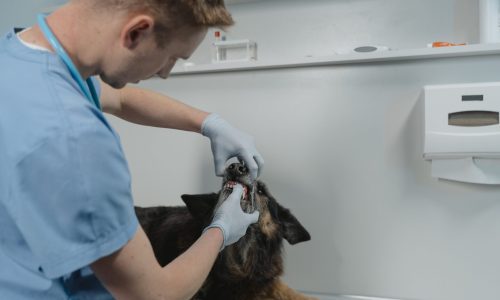By: Dr. Veja Tillman, DVM
Dental abscesses are one of the many dental diseases commonly treated by veterinarians. This disorder not only affects your pet’s daily life but, at times, may be life threatening. Do not ignore your pet’s dental health as it is an important part of your pet’s overall health and wellness.
WHAT IS A DENTAL ABSCESS?
Dental abscesses (also called a tooth abscess) are painful pus-filled swellings caused by infection of the teeth or gums next to the tooth root and surrounding structures. This condition occurs when bacteria enter the soft tissue in the middle of the tooth (called the pulp cavity), or the gums. Tooth abscesses can be caused by tooth decay, cracked, or fractured teeth or gum disease (periodontal disease). It is a common health problem affecting many dogs and cats each year.
WHAT ARE THE SIGNS OF A TOOTH ABSCESS?
- Swollen, puffy or red gums
- Bad breath
- Swelling of the face
- Mouth or face pain
- Bleeding from the mouth
- Lethargy; Depression
- Poor grooming
- Excessive drooling
- Decreased or loss of appetite
- Dropping food from mouth while eating
- Fever
- Discharge from the nose or eyes
- Pawing at the face
MANAGEMENT AND PREVENTION
Dental infections must be treated immediately with antibiotics and pain medication, followed by appropriate dental treatment. Antibiotic treatment on its own will not cure the tooth abscess, it must be treated by a veterinarian. Left untreated, a tooth abscess can lead to a serious infection of the jawbone, teeth and surrounding tissue. In rare cases, bacteria from dental abscesses can spread to the blood causing life threatening sepsis (blood infection).
Early detection of dental abscesses is vital. To detect dental disease before it negatively affects your pet’s quality of life, schedule regular dental evaluations with your veterinarian at least every 6 to 12 months. Dental exams should be performed as part of your pet’s regular preventive care. During the examination, your veterinarian will identify any problems or concerning areas in the mouth and recommend treatment.
Routine professional dental cleaning is recommended at least once a year to maintain healthy teeth and gums for your pet. Removing plaque and tartar from teeth beneath the gumline and removing diseased teeth from the mouth are vital in maintaining your pet’s overall health.
Homecare is also an essential part of taking care of your pet’s oral health. Brushing your cat or dog’s teeth every day (or as often as you can) will promote good oral health and prevent potentially expensive surgeries down the road.
February is National Pet Dental Month!
Contact your veterinarian today to schedule a Complete Oral Health Assessment, Dental Cleaning and to discuss your pet’s dental health.
ABOUT DR. TILLMAN
Dr. Tillman is a 2002 graduate of Tuskegee University School of Veterinary Medicine. Her veterinary practice and work experience focuses on health and wellness of pets. She is the owner of Just 4 Pets Wellness Center and can be reached at 239-270-5721.








